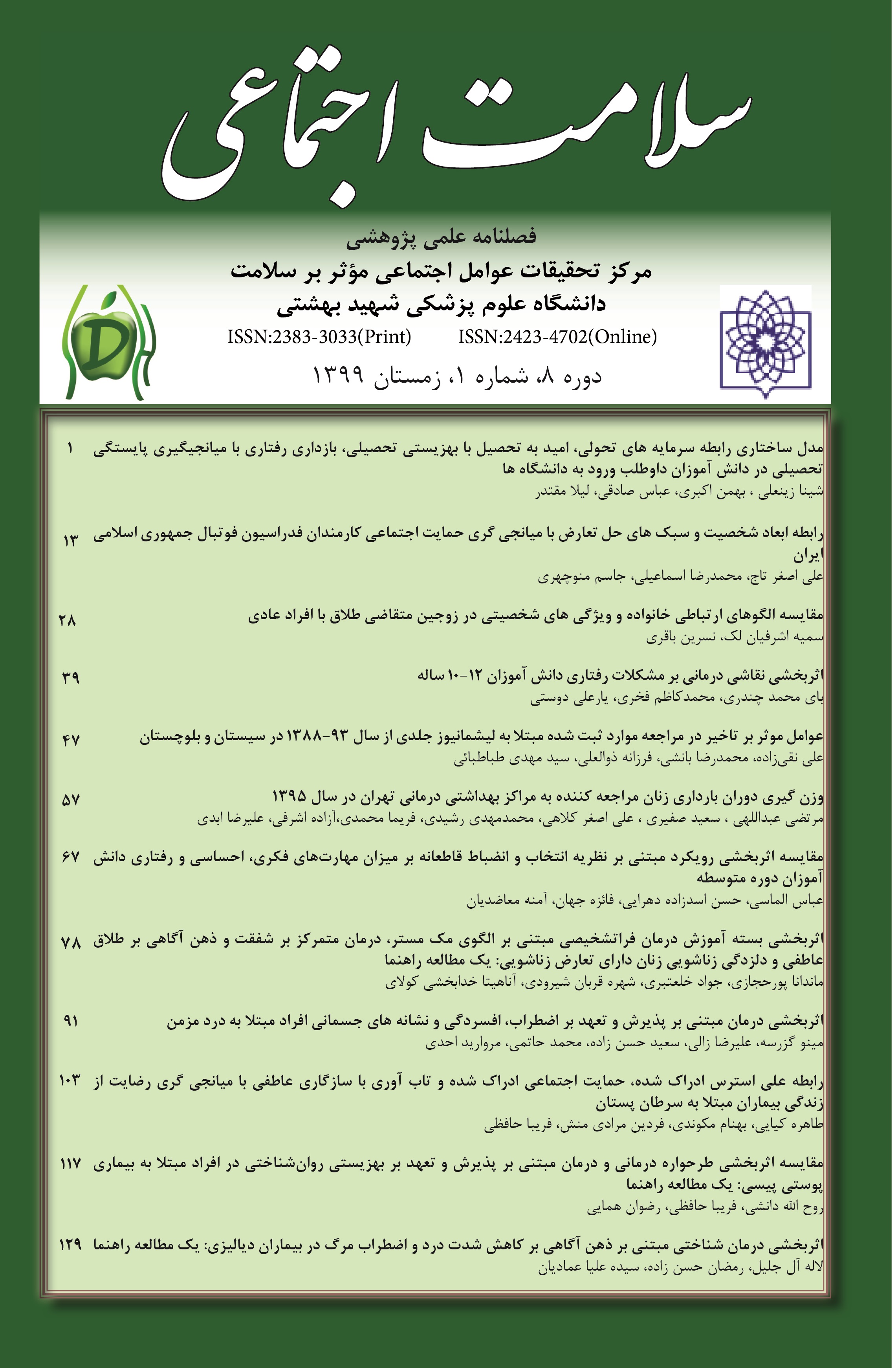رابطه اختلالات رفتاری کودکان با سبک های فرزندپروری و سبک های دلبستگی
سلامت اجتماعی,
دوره 4 شماره 2,
22 May 2017
,
صفحه 118-126
https://doi.org/10.22037/ch.v4i2.14372
چکیده
زمینه و هدف: بسیاری از محققان، اختلالات رفتاری را اختلالات شایع و ناتوان کننده ای میدانند که برای خانواده، محیط و کودک، مشکلات بسیاری ایجاد میکند. هدف مطالعه حاضر، تعیین رابطه اختلالات رفتاری کودکان با سبکهای فرزندپروری و سبکهای دلبستگی بود.
روش و مواد: این مطالعه به روش همبستگی انجام شد. جامعه آماری شامل کلیه دانشآموزان دختر و پسر دارای مشکلات رفتاری پایه سوم تا پنجم مقطع ابتدایی مناطق یک و دو شهر تهران به تعداد 47137 نفر در سال تحصیلی 95-1394 بود. با استفاده از نمونهگیری خوشهای، تعداد 252 نفر به عنوان نمونه انتخاب شدند. دادهها بهوسیله مادران این دانشآموزان تکمیل گردید. آزمون ضریب همبستگی پیرسون و تحلیل رگرسیون مورد استفاده قرار گرفت.
یافتهها: نتایج نشان داد که اختلالات رفتاری، همبستگی مثبت با سبک فرزندپروری مستبدانه (01/0P<) و سبک فرزندپروری سهلگیرانه (01/0P<) دارد. اختلالات رفتاری دارای همبستگی با سبک فرزندپروری مقتدرانه نبود. همچنین اختلالات رفتاری دارای همبستگی منفی با سبک دلبستگی ایمن (05/0P<) و سبک دلبستگی دوسوگرا/ اضطرابی بود (01/0P<). بررسی اثر پیشبینیکنندگی سبک دلبستگی و سبک فرزندپروری بر اختلالات رفتاری حاکی از آن است که این مدل 12 درصد از واریانس را توجیه میکند. سبک دلبستگی و سبک فرزندپروری دارای اثر پیشبینیکننده ای بودند (01/0P<).
نتیجهگیری: مطالعه نشان داد بین اختلالات رفتاری و سبکهای فرزندپروری مستبدانه و سهلگیرانه ارتباط وجود دارد اما ارتباطی بین سبک فرزندپروری مقتدرانه و اختلالات رفتاری وجود نداشت. نتایج مطالعه حاضر، میتواند به روانشناسان کودک کمک کند تا هر چه بیشتر به نقش سبکهای فرزندپروری و دلبستگی والدین پی برده و بتوانند مداخلههای مناسبی را با در نظر گرفتن آن در مورد اختلالات رفتاری کودکان اجرا کنند.
- اختلالات رفتاری، سبک فرزندپروری، سبک دلبستگی
ارجاع به مقاله
مراجع
Senchak M, Leonard KE. Attachment styles and marital adjustment among newlywed couples. Journal of Social and Personal Relationships. 1992;9(1):51-64.
Shaver PR, Mikulincer M. New directions in attachment theory and research. Journal of Social and Personal Relationships. 2010;27(2):163-72.
Pandina GJ, Bossie CA, Youssef E, Zhu Y, Dunbar F. Risperidone improves behavioral symptoms in children with autism in a randomized, double-blind, placebo-controlled trial. Journal of autism and developmental disorders. 2007;37(2):367-73.
Barlow J, Parsons J, Stewart-Brown SL. Systematic review of the effectiveness of parenting programmes in the primary and secondary prevention of mental health problems. Health Services Research Unit, Department of Public Health, University of Oxford; 2002.
Baezzat F, Izadifar R, Peyvastegar M. Comparison of attachment styles of students with conduct disorder, dyslexic and normal. Journal of Behavioral Sciences. 2009;3(3):231-36. [Full Text in Persian]
Ghamkharfard Z, Amrollahinai M, Azad Fallah P. examining the predictors of childhood anxiety based on early maladaptive schemas of children and parenting styles of mothers. Journal of Behavioral Sciences. 2012;6(3):253-62. [Full Text in Persian]
Tambelli R, Laghi F, Odorisio F, Notari V. Attachment relationships and internalizing and externalizing problems among Italian adolescents. Children and youth services review. 2012;34(8):1465-71.
Duchesne S, Larose S. Adolescent Parental Attachment and Academic Motivation and Performance in Early Adolescence1. Journal of Applied Social Psychology. 2007;37(7):1501-21.
Laible DJ, Carlo G, Raffaelli M. The differential relations of parent and peer attachment to adolescent adjustment. Journal of Youth and Adolescence. 2002;29(1):45-59.
Ritakallio M, Luukkaala T, Marttunen M, Pelkonen M, Kaltiala-Heino R. Comorbidity between depression and antisocial behaviour in middle adolescence: The role of perceived social support. Nordic Journal of Psychiatry. 2010;64(3):164-71.
Jonbozorgi M, Nouri N, Hosseini K. The study of relationship building family values and self-esteem of students. Sociology of the family. 2010;19:53-64.
Esfandiari, Gh. Review and compare parenting practices of mothers of children with behavioral disorders and behavioral disorders in children of mothers with normal children educational effect. Master's dissertation, Institute of Psychiatry, Iran, Tehran. 1995. [Full Text in Persian]
Uhing BM, Mooney P, Ryser GR. Differences in strength assessment scores for youth with and without ED across the youth and parent rating scales of the BERS-2. Journal of Emotional and Behavioral Disorders. 2005;13(3):181-7.
Hazan C, Shaver PR. Broken attachments: Relationship loss from the perspective of attachment theory. InClose relationship loss 1992, Springer New York: 90-108.
Besharat MA. Development and validation of Adult Attachment Inventory. Procedia-Social and Behavioral Sciences.2011;30:475-9.
Muris P, Meesters C, van den Berg S. Internalizing and externalizing problems as correlates of self-reported attachment style and perceived parental rearing in normal adolescents. Journal of Child and Family Studies. 2003;12(2):171-83.
Roelofs J, Meesters C, ter Huurne M, Bamelis L, Muris P. On the links between attachment style, parental rearing behaviors, and internalizing and externalizing problems in non-clinical children. Journal of Child and family Studies. 2006;15(3):319-32.
Reitz E, Deković M, Meijer AM. The structure and stability of externalizing and internalizing problem behavior during early adolescence. Journal of Youth and Adolescence. 2005;34(6):577-88.
Allah Jagrdy M, Sarabian S, Asgharpour N. Comparing mothers of children with and without behavior problems attachment ages 12-8 years. Journal of Mental Health. 2014;17(1):26-37. [Full Text in Persian]
- چکیده مشاهده شده: 4168 بار
- PDF دانلود شده: 7421 بار
